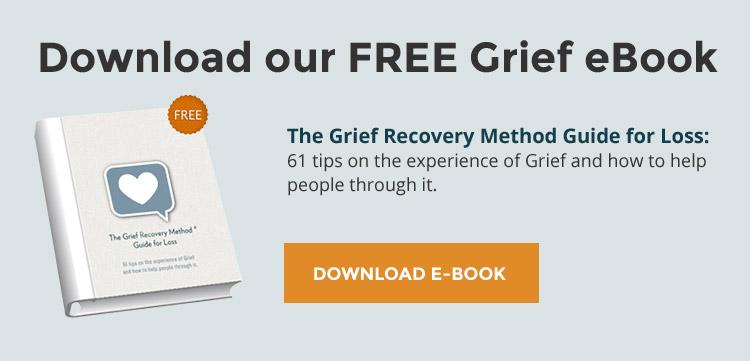The first time an idea or feeling occurs to me, I give it a glance. If it doesn't rivet my attention, I let it pass through and go on its merry way. If the same thought or emotion repeats itself a short time later, I give it a second look and usually release it back into the universe also. Every once in a while, though, if one more impulse grabs my attention, I've learned to apply the law of threes and stop and give it a more in-depth examination. Yesterday, I had one of those three-peats rear up and grab my attention. I'm sure that you won't be shocked to learn that the subject matter of the tap, tap, tap on my shoulder bears a direct correlation to the hidden topic of recovery from grief - or people's reaction to loss. Surprise, surprise, surprise!
Yesterday, as the result of three different interactions with three different people at three different times, one of those cartoon light bulbs appeared over my head. The essence of the recurring theme was the good intentions implicit when people try to help their family members or friends who are struggling with emotional reactions to events - both large and small. It's safe to presume that the objective of a personal communication is to create connection between the people involved. But what often ensues is unsolicited advice, which is bad enough in its own right - make that, in its own wrong. Worse, the unasked-for advice is almost always incorrect, which puts a second wedge between the participants.
Here's how it happens:
Typically, someone says that they are having a hard time dealing with something that has affected them emotionally. They may say they are sad, or depressed, or in a funk, or lacking energy. They are simply trying to explain how they feel. They almost never follow their statement with the question, "And what do you think I should do about the feelings I'm having?" But even absent any question, the well-intended listener leaps right in and offers, "Don't feel bad, tomorrow's another day." One problem is that tomorrow is not the question - the other is that there was no question at all. The speaker wanted to be heard, and perhaps at most, acknowledged, but not repaired. Answering an unasked question robs the speaker of the dignity to ask for help if needed. Here's a different scenario. You're talking to a friend who tells you that he or she is feeling good. Work life and home life thrive and all's well. You wouldn't respond to that non-question by saying, "Don't feel good, tomorrow's another day." Sounds really weird, doesn't it? Okay, let's go back to tomorrow, an awkward journey, but we'll indulge that leap into the future, just this once. Intellectually speaking, it is almost 100% guaranteed that the sun will come up tomorrow. But tomorrow is neither the question nor the solution. The speaker, who has told how bad he or she feels, feels bad today. And that speaker has not asked a single question, nor suggested that feeling bad was anything more than a report on his or her current condition. We recognize that family and friends are genuinely concerned about our well-being. But any unsolicited response that begins with, "Don't feel bad..." is usually going to disconnect rather than join. The intention is not at debate. It's the actions that we want to highlight here. First and foremost is the fact there was no call for help. Second, telling someone who says they feel bad, that they shouldn't, just because you say so, doesn't make much sense. And since we're dealing in threes here - it puts them in direct opposition to the truth they've just stated. Now they're in conflict with themselves as well as you. Remember, the purpose of the original communication was to create connection or harmony, not a wedge. Okay, we've defined the problem, so what's the solution? Simple - Don't answer questions that were not asked. Don't fix things that aren't broken. If you wouldn't try to fix a happy or good feeling, then don't try to fix a sad or painful feeling. Besides, you can't fix feelings anyway. All you can do is hear them and acknowledge them. If you ever wondered what good listening is all about, now you know. Okay, I will now climb down off my soapbox and return you to your regularly scheduled programming

























Add new comment